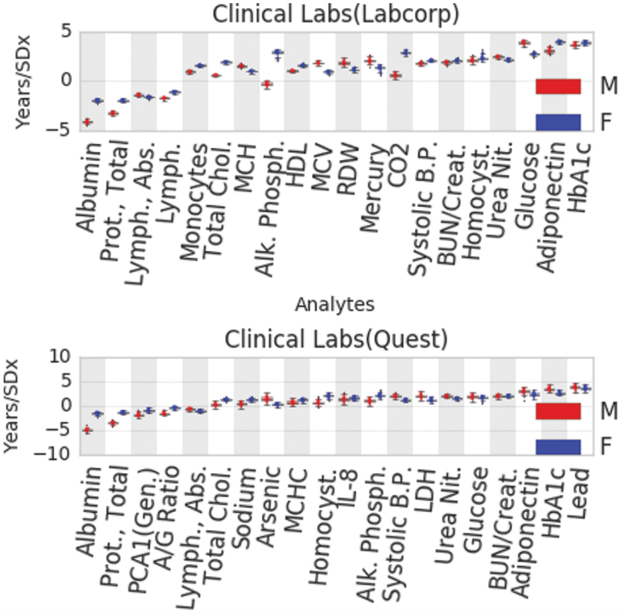Three studies have investigated the ability of blood test analytes to predict biological age. First, when considering the top 20 variables that were associated with biological age in aging.ai, albumin contributed most to this prediction, almost 2x more than circulating levels of glucose (Mamoshina et al. 2018):

Second, albumin was one of the 9 blood test variables that were best able to predict biological age when using the Phenotypic Age calculator. However, as shown below, it didn’t come in first place, but fifth. Interestingly, the analyte that contributed most to biological age prediction was the red cell distribution width (RDW%), with glucose again in second place (Levine et al. 2018):

Third, Earls et al. (2019) used the Klemera-Doubal algorithm (Klemera and Doubal, 2006) in conjunction with blood test data to predict biological age. Regardless if the blood was analyzed by Labcorp or Quest, higher levels of albumin (the left side of both images below) were associated with the greatest reduction in biological age, up to 5 years! In contrast, HbA1c was associated with a higher biological age when measured by Labcorp (top image, right side), and second to lead in the Quest analysis (bottom image, right side). Interestingly, glucose came in third and fifth in the Labcorb and Quest data sets, respectively, in terms of its positive association with biological age.

Glucose would’ve been an obvious choice, but would you have guessed that albumin may be just as important, and potentially more important for predicting biological age?
If you’re interested, please have a look at my book!
References
Earls JC, Rappaport N, Heath L, Wilmanski T, Magis AT, Schork NJ, Omenn GS, Lovejoy J, Hood L, Price ND. Multi-Omic Biological Age Estimation and Its Correlation With Wellness and Disease Phenotypes: A Longitudinal Study of 3,558 Individuals. J Gerontol A Biol Sci Med Sci. 2019 Nov 13;74(Supplement_1):S52-S60. doi: 10.1093/gerona/glz220.
Klemera P, Doubal S. A new approach to the concept and computation of biological age. Mech Ageing Dev. 2006;127:240–248. doi:10.1016/j. mad.2005.10.004
Levine ME, Lu AT, Quach A, Chen BH, Assimes TL, Bandinelli S, Hou L, Baccarelli AA, Stewart JD, Li Y, Whitsel EA, Wilson JG, Reiner AP, Aviv A, Lohman K, Liu Y, Ferrucci L, Horvath S. An epigenetic biomarker of aging for lifespan and healthspan. Aging (Albany NY). 2018 Apr 18;10(4):573-591. doi: 10.18632/aging.101414.
Mamoshina P, Kochetov K, Putin E, Cortese F, Aliper A, Lee WS, Ahn SM, Uhn L, Skjodt N, Kovalchuk O, Scheibye-Knudsen M, Zhavoronkov A. Population specific biomarkers of human aging: a big data study using South Korean, Canadian and Eastern European patient populations. J Gerontol A Biol Sci Med Sci. 2018 Jan 11.

Thank you. I also noticed the particular role albumin plays across multiple biological age estimators. I also did note the particular weight of RDW in Levine’s Phenotypic Age. However, for having asked the authors, I was told the weights were not standardized in the original paper, hence I guess the relative biomarkers could not be compared against each other to guide clinical relevance for BA.
LikeLike
Pingback: 20: Optimizing Biological Age with Dr. Michael Lustgarten, PhD. | The Art of Fitness and Life